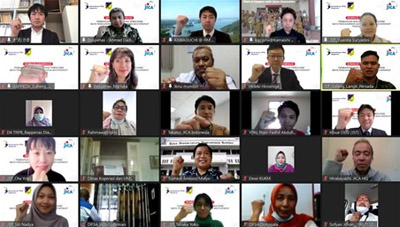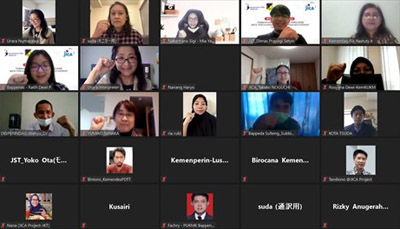- Home
- Technical Cooperation Projects
- Index of Countries
- Asia
- Indonesia
- Project for Development of Regional Disaster Risk Resilience Plan in Central Sulawesi
- Project News
- Dissemination Seminar for Reference Manual to Develop Livelihood Recovery and Community Restoration in Central Sulawesi in Indonesia
Project News
2021-01-20
Dissemination Seminar for Reference Manual to Develop Livelihood Recovery and Community Restoration in Central Sulawesi in Indonesia
- Convey Japanese experience and lessons-learned of recovery and restoration from Great East Japan Earthquake -
A webinar for the dissemination of "the Reference Manual of Livelihood Recovery and Community Restoration" was held on January 20, 2021. The Reference Manual was developed as a part of the activity of the Project for Development of Regional Disaster Risk Resilience Plan in Central Sulawesi in the Republic of Indonesia (hereinafter mentioned as "the Project").
The Project supports livelihood recovery and community restoration activities as one of the important components of the reconstruction in collaboration with the Ministry of National Development Planning (Bappenas), related ministries, and disaster-affected regency/municipality in Central Sulawesi Province. In December 2019, the draft Reference Manual, targeting the local government officials, was developed. It covered the key points for successful implementation and points to be noted that were verified through the actual reconstruction project implementation. The Project continued updating the Reference Manual based on the lessons learned and experiences from the pilot projects of the Project in 2020.
A total of 85 participants from Indonesia and Japan joined the webinar for the purpose of further dissemination and effective utilization of the updated Reference Manual. Indonesian participants were from central government officials including the Ministry of Cooperatives and Small and Medium Enterprises, local government officials from Central Sulawesi Province, Palu City, Sigi Regency, and Donggala Regency, and members of NGOs that engaged in reconstruction assistance in Central Sulawesi Province. Japanese participants were from officials from Higashi Matsushima City and Kamaishi City, who are members of the advisory committee of the Project, and officials of JICA Headquarters.
The seminar introduced a story about a group of culinary business, mostly run by women in the community, that was affected by liquefaction landslide in the disaster. The group participated in an activity of the pilot project and started the business in the temporary shelter site. The group then continued their business even after moving to the permanent housings. The group leader, Ms. Rahmawati, reported the assistance from the Project including book-keeping training and receipt of the necessary equipment and the cash grant from the Department of Cooperatives and SMEs and NGOs. She conveyed a message with a full of hope to extend the activities and provide more working opportunities to the women around her.
The topic of the panel discussion was how local governments should collaborate with the communities and central government. In the questions and answers session following after the panel discussion, officials of Higashi-Matsushima City and Kamaishi City made comments on what needs to be taking into account at present reconstruction stage based upon their experiences, by assuming if they were the officials of Central Sulawesi Province or disaster-affected regency/municipality .
At the last part of the panel discussion, Japanese panelists conveyed the messages to Indonesian local government officials as the pioneers of reconstruction activities. They commented that "Municipal officials should be highly motivated and take conscious efforts on ‘building back better'", "Reconstruction is like a marathon, and it is important not to stop moving forward while having a long-term vision", "In order to foster new values that make Central Sulawesi Province better than before the disaster, we hope that you would involve younger generation as a driving force for the future".
Since 2019, the Project has provided opportunities for interactions between Indonesia and Japan such as on-site seminars with local government officials from Higashi-Matsushima City and Kamaishi City, and Knowledge Co-Creation programs for the Indonesian government officials to visit post-disaster reconstruction sites in Japan. Through these activities, an Indonesian counterpart official who participated in the reconstruction activities pointed out that Indonesia can learn from the basic idea of Japanese reconstruction experiences, which is, always standing by the vulnerable groups. Moreover, it is also good opportunity for Japanese side to learn about Indonesia's recovery and reconstruction activities based on community empowerment with different social background.
Mr. Hirabayashi, a senior advisor of JICA, made a remark that he hopes that affected people centered approaches to disaster reconstruction will make a steadily progress and become a model for other regions. He also expressed awish to disseminate the experience to the world in cooperation with Indonesian officials and Japanese local government officials in Tohoku region, including Higashi-Matsushima, Kamaishi and others which are recovering from the Great East Japan Earthquake. Bappenas , the main counterpart of the Project, responded by expressing a strong willingness for the dissemination. Bappenas commented that the preparation of the Reference Manual was one of the milestone of the Project, and it was developed from mutual heart-to-heart relationship between Indonesia and Japan.
Although the livelihood recovery and community restoration activities in the Project are completed, the Project wishes that the Reference Manual that was developed by the Project based on the lessons learned and on-site experiences will be disseminated to Indonesia and support the reconstruction with the affected people centered approaches in Central Sulawesi Province and other regions. It is hoped that the reference manual will continue to be improved over the future while walking forward together with the people in Indonesia to overcome the disaster.
 Online seminar
Online seminar
 Group Photo of Dissemination Seminar
Group Photo of Dissemination Seminar
 Group Photo of Dissemination Seminar
Group Photo of Dissemination Seminar
 Culinary group supported by Project (from interview video broadcasted)
Culinary group supported by Project (from interview video broadcasted)
(Left: Evacuation shelter, Right: Store in front of house after relocation)
- About JICA
- News & Features
- Countries & Regions
- Our Work
- Thematic Issues
- Types of Assistance
- Partnerships with Other Development Partners
- Climate Change / Environmental and Social Considerations
- Evaluations
- Compliance and Anti-corruption
- Science and Technology Cooperation on Global Issues
- Research
- JICA Development Studies Program / JICA Chair
- Support for the Acceptance of Foreign HRs / Multicultural and Inclusive Community
- Publications
- Investor Relations
